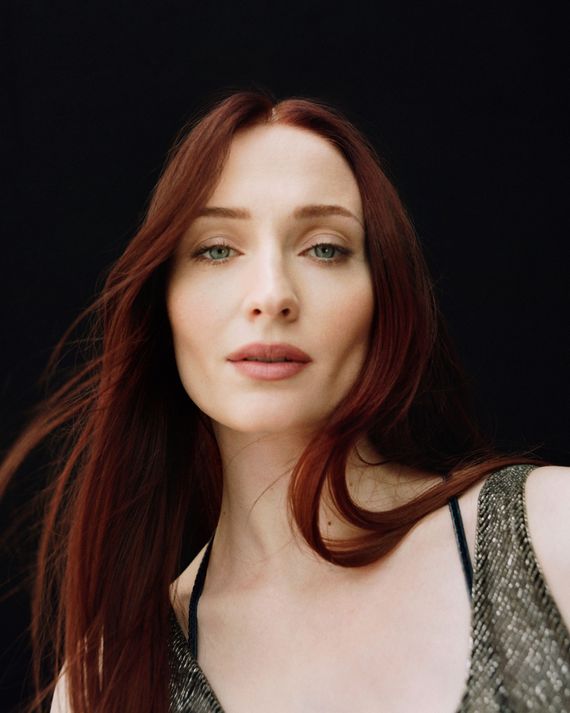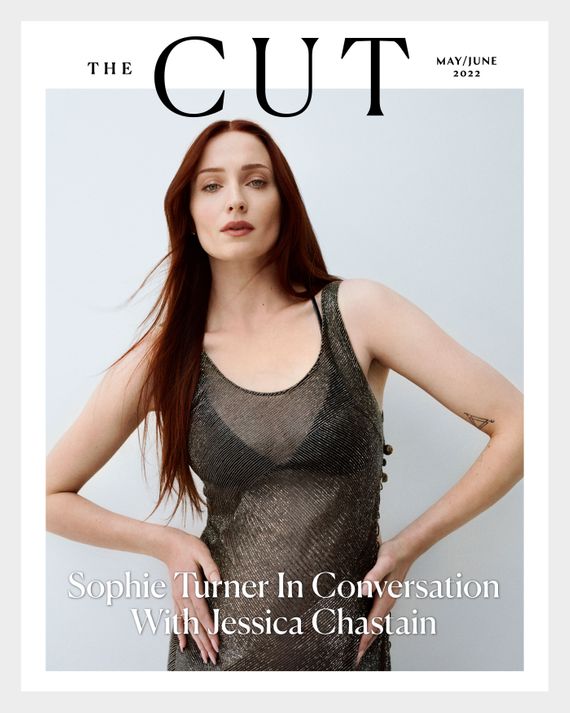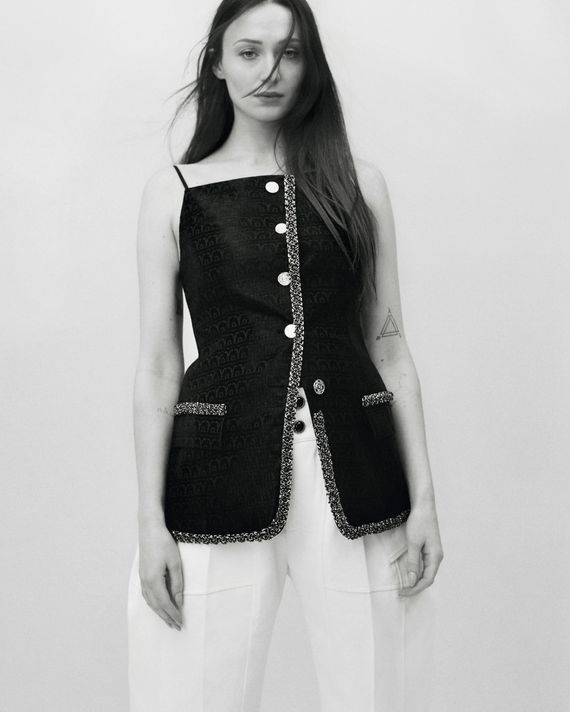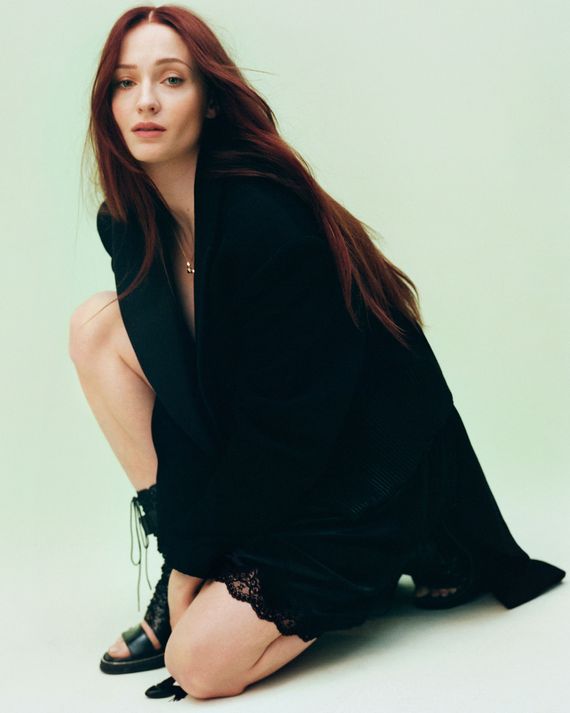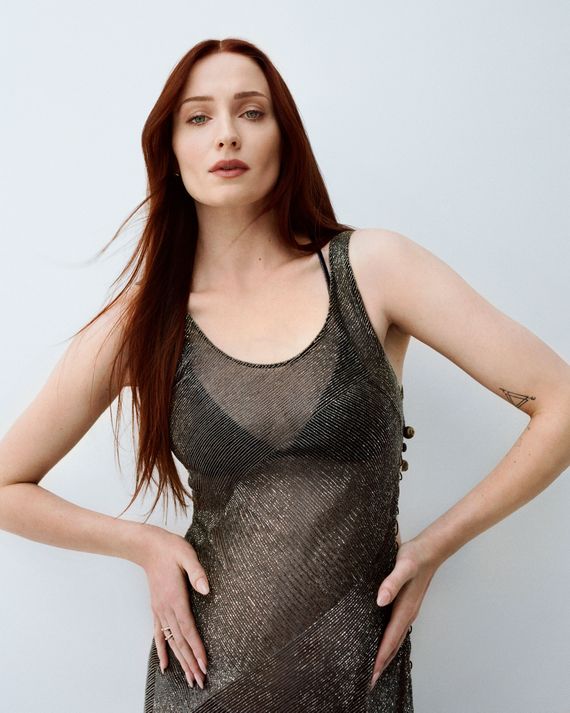
“For ten years, I felt like I needed to be the person that everyone else saw because I was growing up and I didn’t know anything else,” Sophie Turner told Jessica Chastain about coming of age in public as the resilient daughter Sansa Stark on Game of Thrones and the telepathic mutant Jean Grey in X-Men. “I feel like I’m only on the beginning of my journey of evolving into a person I probably should have evolved into.”
Now, Turner is 26 with a husband (equally famous former child star Joe Jonas) and a second baby on the way and a new show, The Staircase, on HBO Max. (The miniseries, co-starring Toni Collette and Colin Firth, tells the true story of a wife’s suspicious death and the investigation that followed.) For the Cut’s May-June cover, the actor spoke with friend and former Marvel co-star Jessica Chastain about what they have in common — particularly how they manage their desire for people to know them more for their work than their private lives.
“I spent a lot of time making mistakes and failing and learning a lot about the industry and about developing characters. But my failures got to be in private,” Chastain said. “I find it so admirable but also unfair that everything is being watched.”
In the below conversation, Turner and Chastain also talk about finding some semblance of normality, the growth they’ve experienced, and their commitment to staying true to themselves.
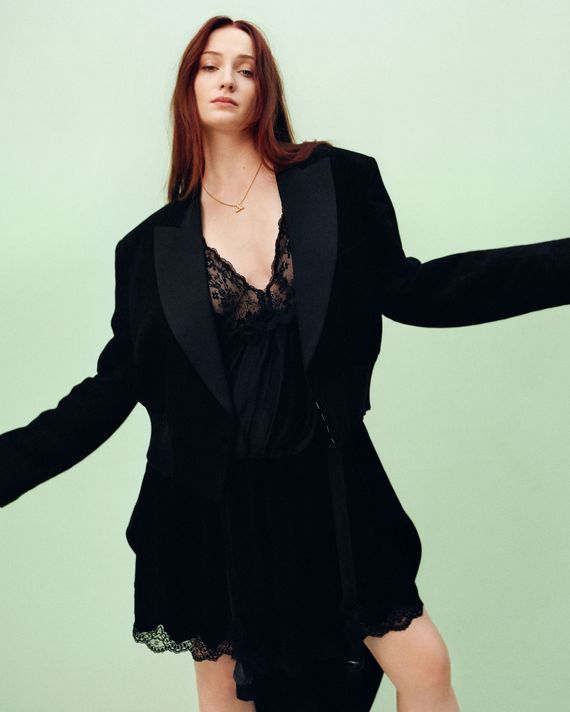
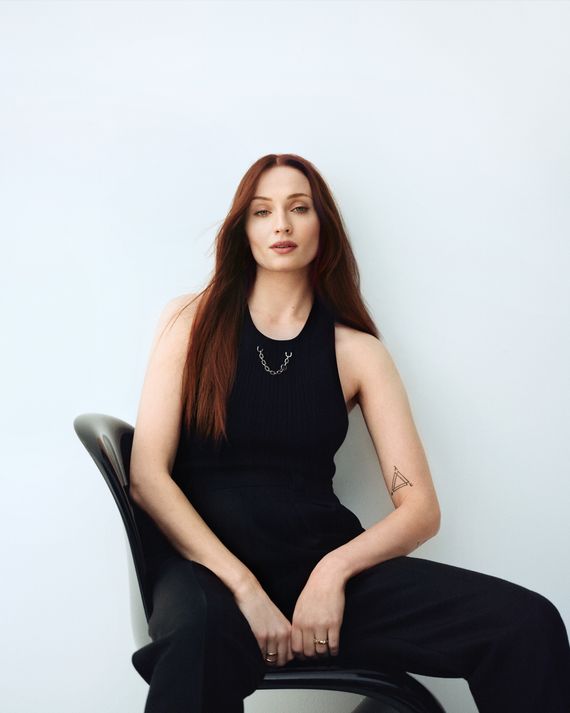
Jessica Chastain: Do I have lipstick on my teeth? I put it on really quick. Where are you right now? Your backdrop is pretty cool.
Sophie Turner: No, you look great; I’m in Miami. I just moved here with Joe. When Joe was like, “Let’s move there,” I was like, “I don’t know. I’ve never seen myself as a Florida girl.” But it’s so family friendly, and the food is amazing here.
Jessica: Right now, the Florida bills aren’t so friendly —
Sophie: Yeah. There are a few things … That’s why I was like, “We’re really going to move to Florida?”
Jessica: The good thing is, though, the more open-minded, empathetic, compassionate people that live all over the world, the better we are as a society.
Sophie: It’s a blue city in a red state, so it’s nice to be around like-minded people; you have to come to visit. I feel like we haven’t physically seen each other since around 2019? When we were doing press years ago, I was intimidated to meet you. And then you took me under your wing and I felt so protected and in such a safe space with you.
Jessica: It’s been really exciting to see how your life has taken shape over the past few years. And everyone, I’m sure, has their ideas of who you are because of how they watched you grow up and now the career you’re forging. How does it feel to shed, I guess, perceptions of how people saw you as you now play other things?
Sophie: It’s amazing because I think for ten years, I felt like I needed to be the person that everyone else saw because I was growing up and I didn’t know anything else. Other than the character that I was playing in Game of Thrones and then other people’s perceptions of me, I didn’t have time to figure out who I was as a person. And so when Game of Thrones ended, I started developing, like, a personal life and then finally a taste for what I actually wanted to do in my work and things like that. I feel like I’m only on the beginning of my journey of evolving into a person I probably should have evolved into about ten years ago.
Jessica: Are you kidding me? You are so young. I didn’t have movies come out until I was in my 30s.
Sophie: I remember talking about this back in our X-Men days — you started much later on, and you accomplished so much in such a short amount of time. What was that like for you? Because my growing up happened on a film set, and you grew up in a completely different world and then shifted so suddenly into the big leagues of acting and at such a rapid pace.
Jessica: I see it as a huge gift. At the time, it didn’t feel like it because I would say to myself, When am I going to get the attention I deserve? And I wasn’t ready. I spent a lot of time in that frustration, making a lot of mistakes and failing and learning a lot about the industry and about developing characters. But my failures got to be in private. And so I have such empathy for you, for anyone who is going through that in the public eye. I said that to Kristen Stewart as well; I find it so admirable but also unfair that everything is being watched.
Failure can be the most exciting part of a life because it’s the only way you learn something. You don’t learn if you’re knocking it out of the park every time or getting everything right. The more mistakes you make, the more you learn. But you’ve carved out a life outside of Hollywood. Did that come from not being afforded that at a young age?
Sophie: I think not being afforded that, but I also think when you are 13, 14, 15, you get caught up in social media like any other kid. I felt I overexposed myself to the point where I welcomed everything in and everyone in on their opinions. Now, I think I would fight harder than I ever have to try and protect that.
I also think it’s not good for an actor to overexpose yourself. It’s important to have a sense of anonymity so that people can see you as other characters and believe it and not know you as just like, “Oh, Sophie.”
Jessica: Right, right. “Sophie, who is married to this person, who is this person’s mom.” Yeah.
Sophie: Exactly, but you do it with such ease. Scenes From a Marriage and then The Eyes of Tammy Faye are two projects that came out in the past year that were completely polar opposites.
Jessica: Everything, before you get on a set, leads you to that character. So every moment of your life in some aspect. I prepped for seven years before I got on set to play Tammy Faye. And so that was quite a long process; that’s the longest I’ve ever had preparing for a role. And then with Scenes From a Marriage, it was like no prep, because it was during the pandemic. We started shooting in October 2020.
Sophie: Oh my God.
Jessica: We were one of the first ones to come back. But I had been unknowingly prepping because I watched all of Bergman’s films. When they asked me to do it with, like, no prep, I kind of knew a place to start from. And then also there was so much claustrophobia in that, because we were all isolating in our houses. So I really just used the experience of the past, of those six months, to kind of feed it, because it was Oscar and myself in a house almost every episode; it’s just the two of us. What was it like for you in shooting The Staircase? I know you play the adopted daughter, but this will be spoiler free.
Sophie: I initially watched the documentary about a man who may or may not have pushed his wife, Kathleen Peterson, down the stairs. And the docuseries is kind of documenting the trial and an interpretation about the family and the life that Kathleen had leading up to her death. And the ripple effects of this trial that it has on the family, the ripple effects of assumption and presumption, and how that can be an incredibly dangerous thing.
You see the family being documented throughout this series as well. There’s a lot of corruption and layers, but my character Margaret is the adopted daughter of Michael Peterson — she and her sister, Martha, have been under Michael’s protection since they were born. But their mother also passed away from falling down the stairs, when Michael Peterson was in that house. So there’s a bit of a Stockholm syndrome, and the way that they blindly support him throughout this trial is something that we get to explore a little more in the show than the docuseries explored.
Jessica: What about playing Margaret was fun or interesting? What did you learn in exploring her?
Sophie: The stillness that the family had when the trial was going on was fascinating. I remember watching the documentary, and it was a bizarre dynamic between all of the different people in the family. To see the man they all put on a pedestal, the glue that held this amalgamation of people together, was the person who pulled them apart as well. And Margaret herself slowly lifts the veil and has an incredible arc throughout this story.
Jessica: Why do you think she’s so blindly loyal? When you say Stockholm syndrome, was it the sense of like, “Well, this person raised me, and I need to …”
Sophie: Her sister and Michael are really the only constants that she’s had in her life. She grew up with a mother who passed away from what supposedly was an accident. And then she was adopted by Michael, went to live with him and his first wife, and then they split up. And so there was another big kind of trauma in her life there.
And then Michael marries Kathleen Peterson. And then I think once she passed away, Margaret feels a sense of like, “If I don’t cling onto this man, then what do I have? Who do I have?” The only way for her to keep it together is to remain blindly loyal to him out of fear.
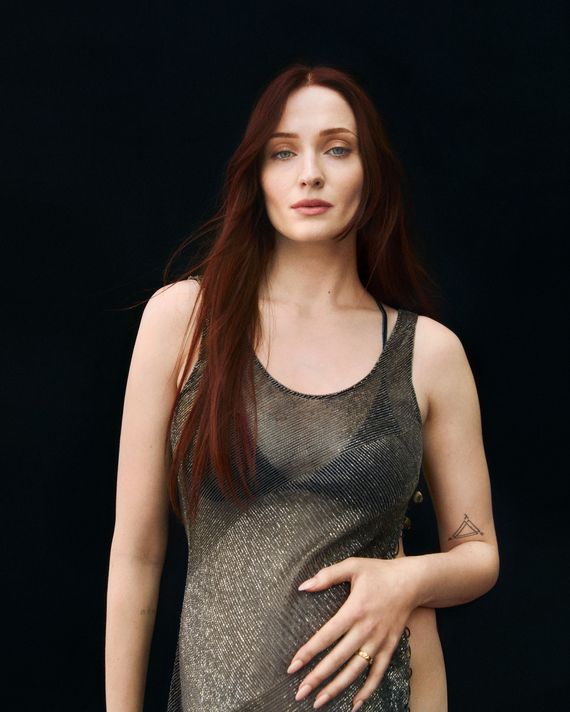
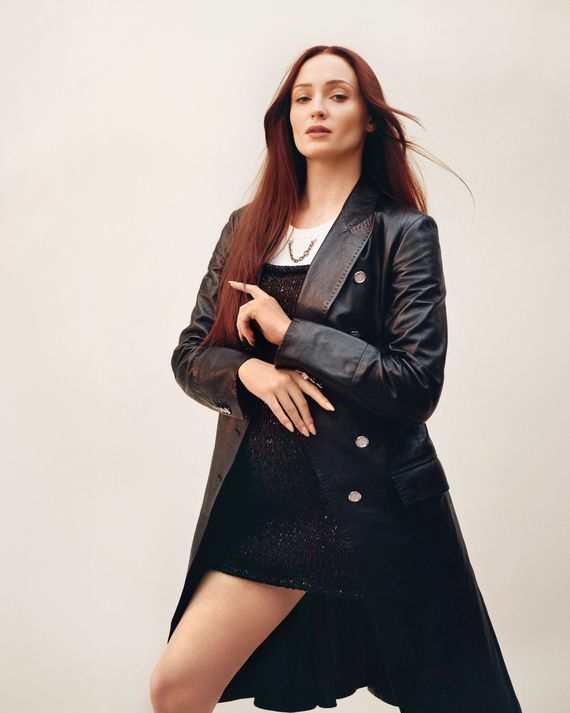
Jessica: And how was it working with the actors? The cast is insane.
Sophie: I have to say, watching Colin Firth play this role and the transformation up close, it was really amazing to get a front seat to that. I’ve never really worked on something necessarily where an actor has had such a physical transformation. His voice, the way he had held himself — I didn’t see Colin anymore. I drew inspiration, not only from their process and how Colin would get into character, and I just felt like I’d won a competition, but I feel like that way with everything I do. I’m like, “How did I get here?”
Jessica: Oh, stop!
How do you go into a character and then let it go to go back to Sophie and have your normal life again? Do you have a ritual?
Sophie: It’s so weird. I don’t, but I kind of find it quite easy to go in and out. You saw on X-Men, in between takes, singing and dancing together. It does help having people around that are also willing to step out of it as well. And it’s just something that growing up on a show like Game of Thrones, the subject matter was so heavy that I just developed a coping mechanism of just having the most fun in between takes, so I wouldn’t get traumatized.
Jessica: Does it still affect you like some kind of trauma?
Sophie: I’m sure I’ll exhibit some symptoms of trauma down the road. At that age, I don’t think I could comprehend a lot of the scene matter. And the first few years, I had my mom with me because she was chaperoning me, so she would be very helpful and give me snacks. I don’t know what it is, but I feel like a 10-year-old in a school play again when someone that I know comes and sees me on set. I feel so embarrassed.
Jessica: The whole idea of walking onstage and being like, “Thank you,” and bowing, I find it so cringey for me. It goes immediately to like, “You’re welcome for my performance.” It’s so uncomfortable. When I’m acting, I don’t want someone to say, “Good job.” Because I also think in the back of my head, “Are you being authentic?”
Sophie: It’s such a personal thing to you when you’re acting. And then to feel like you are waiting for the validation of someone else.
Jessica: But that’s kind of the great thing about film and television, is that it’s a delayed response, right? Like theater, it’s immediate. You get off the stage, and the people are there to talk to you about your performance. And sometimes I’m not really in my body yet; I’m kind of trying to just calm down from what just happened.
Sophie: I actually would love to know this because I struggle with it still to this day, where I’ve read so many scripts and I go, “Was that amazing? Or am I just in a really good mood? Or is that character just amazing?” What is the one thing in a script that you look for that makes you go, “That’s it”?
Jessica: For me, it’s been more so asking myself, Have I done this before? Am I charting new territory? Am I learning anything from it? Am I allowing myself the opportunity to fail?
I’m looking for the opportunity to fail, which I know sounds insane because most people look for the opportunity to succeed. But if you’re reading a script, you’re like, “Oh yeah, this is no problem for me.” Then, I don’t know, for me, if I’m challenging myself. But if I look at something and I’m like, “Oh, God, this could be a disaster because I’ve never done this before, or I don’t know if the audience is going to accept me doing this, or maybe this goes against stereotypes of gender or what is acceptable in our society,” that’s actually what’s been interesting to me. I’m allowing myself the opportunity to grow, rather than waiting on someone else to challenge me.
Sophie: Any advice that you have, I will follow!
Jessica: I don’t think you need any advice. I said this to you from the moment we met. I hope that you get to a place where you really understand how great you are. And maybe that’s something that’ll never come, because there’s a lot of incredible actors and artists who never really get it. And maybe that’s why you’re so good. I know that we ain’t seen nothing yet when it comes to you.
All clothing and accessories by Louis Vuitton, available at select Louis Vuitton stores, 1-866-VUITTON, and louisvuitton.com.



